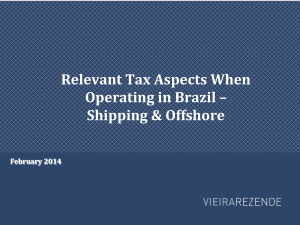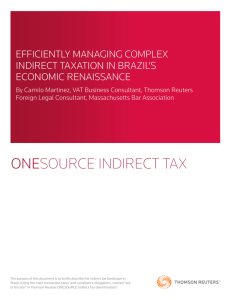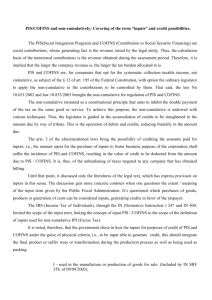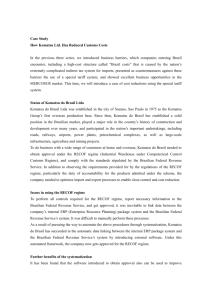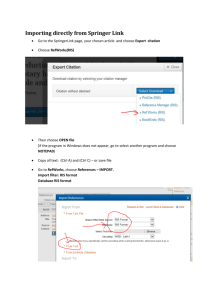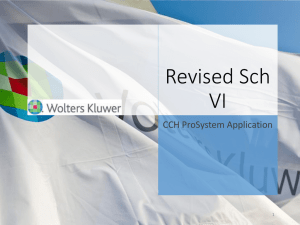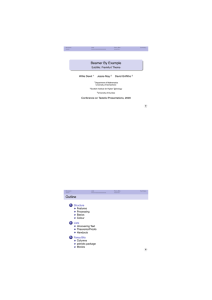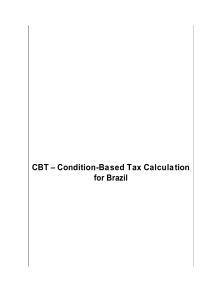Selected Issues on Brazilian Taxation
advertisement
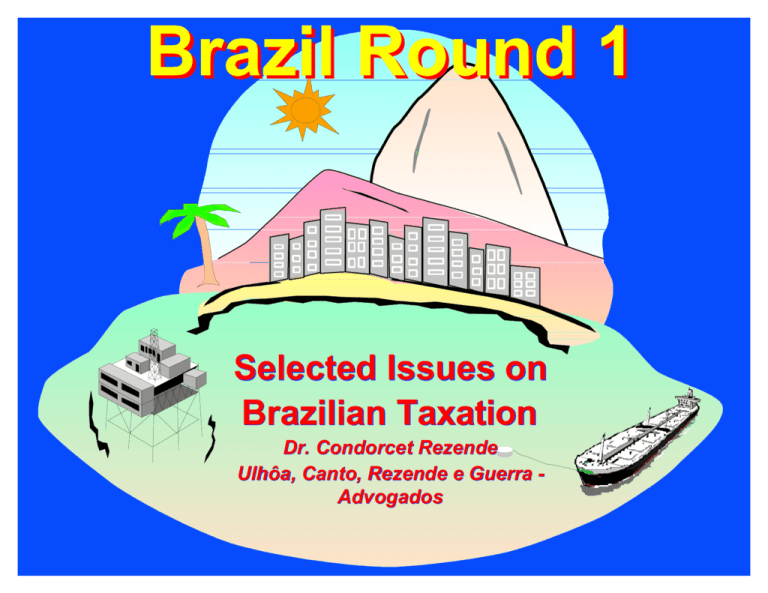
Brazil Round 1 Selected Issues on Brazilian Taxation Dr. Condorcet Rezende Ulhôa, Canto, Rezende e Guerra Advogados Brazilian Tax System Introduction Basic principles of Brazilian taxation set forth in Federal Constitution and National Tax Code Constitution assigns and sets forth limitations on taxing power Tax Code specifies manner of exercising taxing power and rules to prevent conflicts of taxing power Brazilian Tax System - Important Constitutional Principles Taxes and social security contributions created only by legislative act or (in case of Federal taxes only) by a Provisional Measure issued by the President of Brazil and approved by Congress Generally, tax rates can be increased only by legislative act. Exceptions (by President or his delegate): Import and export taxes IPI (value-added federal excise tax) IOF/IOC (federal tax on the purchase and sale of foreign currency) CPMF (temporary contribution on financial transactions) Brazilian Tax System - Important Constitutional Principles (Continued) Tax laws may not be imposed retroactively No tax or tax rate increase may be imposed in the same calendar year as enacted. Exceptions: Social Security contributions and CPMF (may be applied ninety days after enactment) With respect to rate increases, import and export duties, IPI and IOF (effective immediately) Brazilian Tax System - Introduction (Continued) Important rules in the National Tax Code Definition of events that trigger federal, state and municipal taxes Computation of basis for each federal, state and municipal tax Persons subject to each federal, state and municipal tax General rules on tax obligations, assessments, and credits Statute of limitations (generally 5 years) States and municipalities can vary rates of local taxes, but not types and structure of taxes Federal Taxes - Types Individual and corporate income tax / Social contribution on profits (CSL) Incl. withholding tax on certain payments abroad Import and export taxes Tax on foreign exchange transactions (IOF) Temporary tax on financial transactions (CPMF) Value-added excise tax on manufactured goods (IPI) Federal Taxes - Income Tax No special income tax regime applicable to petroleum exploration, development or production However, special rules govern application of ICMS (a state value-added tax) to certain petroleum-related transactions Rules for mining might apply by analogy Current tax treatment of Petrobras not a precedent Certain special rules (e.g., immediate deduction of pre-production expenses) apply specifically to Petrobras Under non-discrimination principle, these rules will lapse unless applied to entire industry Difficult to predict likelihood of such extension Federal Taxes - Income Tax (Continued) Individuals and corporations resident in Brazil taxed on both Brazilian and foreign-source income Consortia not taxed as an entity Treated like a partnership Members taxed on pro rata share of income and expense No consolidation of corporate groups for Brazilian income tax purposes Currently, no indexation or other inflation correction for income tax purposes Federal Taxes - Income Tax (Continued) Current corporate rates Income tax - 25% Social contribution on profits - usually 8% (temporarily 12%) Tax losses may be carried forward indefinitely, but not more than 30% of taxable income in any period may be offset by tax loss carryforwards Federal Taxes - Income Tax (Continued) Payments - 3 options Actual taxable income can be determined quarterly and tax thereon paid by the last day of the month following the quarter Estimated tax can be paid monthly Based on "estimated profit", calculated as a percentage of gross operating revenue plus certain gains (e.g., capital gains) but without application of tax loss carryforwards Percentage of gross revenue varies by industry - currently 8% general rate applies to petroleum sector Taxpayer can stop monthly payments when projected yearly total reached Full tax calculation and reconciliation done at end of year Taxpayers with annual revenue < R$24 million can pay tax quarterly based on "presumed profit" "Presumed profit" calculated like "estimated profit" above Federal Taxes - Income Tax (Continued) Deductions - certain expenditures required under Petroleum Law: Signature bonus not 100% deductible at outset; must be amortized over the anticipated life of the Concession Agreement Initially may be Exploration Period Later extended if Development Royalties: deductible currently Special participation: deductible currently Land occupation fee: deductible currently Landowner payments: deductible currently 1% research and development investments Taxes and contributions (except social contribution on profits) Federal Taxes - Income Tax (Continued) Deductions - other expenditures Exploration expenses Generally deferred until production starts, then amortized over expected life of field Dry wells (and other wells that have no further utility) can probably be expensed currently Other ordinary business expenses generally deductible currently Lease payments deductible currently Currently no requirement to capitalize certain leases Federal Taxes - Income Tax (Continued) Deductions - other expenditures (cont'd) Depreciation Capital goods required to be capitalized and depreciated Typical terms vary from 5 to 20 years (equipment generally 10 years; ships 20 years) Platforms can be depreciated as a single unit over 20 years or broken into component parts which are depreciated individually Accelerated depreciation available based on number of working shifts Facilities operated 16 hours per day may be depreciated at 1.5 times ordinary rate 24 hours per day, 2.0 times ordinary rate Federal Taxes (Continued) Withholding tax on payments abroad (in lieu of income tax) Services - 25% Dividends - none Charter transportation by foreign-flag vessels - 0% (unless vessel is chartered in a tax haven, in which case 25%) Interest None on bonds and notes with average maturity over 2 years and approved by Central Bank Otherwise, 15% or 20% (25% if lender in tax haven) Federal Taxes - Imports Imports Generally subject to import taxes and IPI Also subject to ICMS, a state tax Import tax assessed on CIF price (average rate on equipment is 17%) IPI assessed on CIF price plus import tax (average rate on equipment is 8%) ICMS assessed on CIF price plus import tax plus IPI (rate is 17% or 18%, depending on the state) ICMS paid on imports creditable against any ICMS collected on future sales (of goods or equipment) Federal Taxes - Imports Temporary Imports Historically, temporary imports not subject to import tax In 1996, law changed to impose import tax, effective upon issuance of Presidential decree Decree 2889/98 implements and creates transition period to Dec. 31, 2001 Under transition rules, exemption continued for Certain specified types of goods Entering Brazil prior to Dec. 31, 2001 Expected to be in Brazil temporarily Such goods include most equipment used in petroleum sector Under Decree 2889/98, goods entering after Dec 31, 2001 will be subject to import tax in accordance with a formula Federal Taxes - Exports and IPI Export Taxes At present, tax rate on exports of crude oil is zero IPI Cannot be collected on sales of oil or gas Federal Taxes - IOF In fact, not a single tax, but four separate taxes on various kinds of transactions, each with its own features Foreign exchange transactions (i.e., purchase and sale of foreign currency) In general, rate currently 0% Importation of goods - exempt Interbank transactions - 0.5% Remittances to CC-5 accounts - 0.5% Insurance - generally 7% (health insurance, 2%; some cases, 0%) Local borrowings - rates vary from 0% to 0.0164% per day Plus 0.38% (until CPMF restored) Securities transactions - rates vary from 0% to 0.38% IOF rates may be changed by up to 25% at any time by the tax authorities, with immediate effect Federal Taxes - PIS and COFINS Social contributions on revenues PIS - levied on gross revenue (except export revenues) at the rate of 0.65% COFINS - levied on gross revenue (except export revenues) at the rate of 3.0% Federal Taxes - PIS and COFINS (Continued) Some taxpayers have challenged imposition of PIS and COFINS Under Art. 155, Sec. 3, of Federal Constitution, no tax other than import and export duties and ICMS on transactions on electrical energy, telecommunications, fuels, petroleum products or minerals produced domestically. Argue that PIS and COFINS really taxes on such transactions Case before Brazilian Supreme Court So far, 3 of 11 justices (6 enough to decide) have delivered opinions, all supporting the imposition of PIS and COFINS on such transactions State Taxes - ICMS ICMS - levied on: Movement of goods (other than exports) from industrial or commercial establishments Disputed whether transaction also required Interstate and intermunicipal transportation Communications Works like a value-added tax - passed along to final consumer State Taxes - ICMS (continued) Rate currently 17% or 18%, depending on state No ICMS on interstate movement of crude oil or oil products But there is on natural gas (incl. NGL's) - rate currently 12% to 18%, depending on state No ICMS on fixed assets ICMS in practice not levied on intrastate transfer of crude oil from offshore wells to onshore refineries Practice developed re Petrobras Municipal Taxes ISS - tax paid by provider of services of any kind (including services rendered on oil and gas wells) Includes most services for petroleum activities Deductible for income tax purposes Unclear whether can be assessed on services relating to offshore wells, because of doubts regarding the ability of municipalities to exercise offshore jurisdiction Average rate is 5% (municipalities can negotiate lower rates for specified types of services) Double-taxation Treaties Brazil has double-taxation treaties with Argentina, Canada, China, France, Germany, Italy, Japan, Netherlands, Norway, Spain, among others Double-taxation treaties generally follow OECD model Double-taxation Treaties Brazil has double-taxation treaties with Argentina, Canada, China, France, Germany, Italy, Japan, Netherlands, Norway, Spain, among others Double-taxation treaties generally follow OECD model
